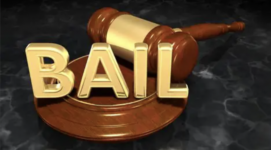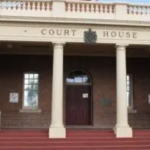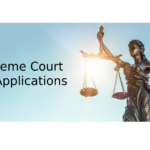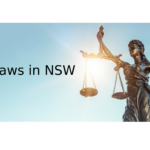How to Deposit Bail Money in New South Wales

The Australian Federal Police arrested Ahmed Talib in Victoria in March 2021, and he was subsequently extradited to Queensland. The then 31-year-old was charged with assisting a foreign fighter arrange to travel to Syria to join a terrorist group.
After close to two years in isolation on remand, Talib’s father, acclaimed academic Professor Lukman Thalib returned to Australia in January 2023, to post his son’s bail money so Ahmed could be released into the community, with conditions applying, prior to standing trial.
On granting bail last January, Queensland Supreme Court Justice Peter Davis described the prosecution case against Talib as weak. His Honour explained that it was likely four years before his jury trial began and he rose questions about the reliability of the police informant involved.
What is bail?
Bail is a promise by a defendant that he or she will appear before the court on the next scheduled date if released from custody.
Bail will normally be continued, or ‘extended’, on each court appearance provided there is no breach of bail, unless the prosecution makes what’s known as a detention application, which is a formal application for bail to be refused.
Bail can be granted unconditionally or conditions may attach, such as reporting to a police station on certain days and times of the week, not associating with witnesses, not entering specified locations, wearing a electronic anklet and that an acceptable person, known as a surety, deposit a sum of money, known as security, which may be forfeited if the defendant fails to attend court.
In Talib’s case, the defendant was back in the Queensland Supreme Court on Wednesday this week, due to a number of bail breach allegations, including that he didn’t recharge an electronic ankle bracelet, which he’d taken to the police station considering the device faulty.
Professor Thalib returned to Australia and posted his son’s bail.
How is bail posted?
Depositing a security, which is sometimes referred to as posting bail, normally involves providing security in the form of a financial deposit, which is to be returned to the individual who paid it on finalisation of the defendant’s case. Breaching bail by not attending, which is also known as ‘absconding’, can result in the forfeiture of that sum.
The funds are required to belong to the person who is posting bail, so it is good practice for that person, the surety, to obtain a bank account statement both before and after withdrawing the funds.
The funds are normally deposited at the court registry in which bail was granted by way of cash or a bank cheque, or in some cases property documents which show an amount of equity in, for example, a home.
Sometimes, the court will allow a person to agree to forfeit an amount of money or a piece of property, rather than physically deposit the security to the court.
Who can post bail?
When bail that requires security or an agreement to forfeit is granted by a court, the surety will need to attend the court registry to prove they are an acceptable person for the purposes of bail, and may also need to prove the money actually belongs to them and is not, for example, derived from pooled funds or from another person or organisation.
This process will involve filling out an acceptable person information form which will ask whether the surety is at least 18 years of age, has no criminal convictions, is not an undischarged bankrupt and is not subject to debt recover action.
The registrar of the court will determine whether these character and source requirements are satisfied.
When can bail be granted?
Bail can be granted by NSW police following arrest and charging. However, if attending officers refuse bail, then the accused will be taken to the nearest NSW Local Court as soon as possible, to have a magistrate determine whether to grant bail, along with any conditions that should apply to it.
If the court refuses bail, the accused then has a second or subsequent chances to apply, as per section 74 of the Bail Act 2013 (NSW). This second chance applies when a change of circumstance or new evidence can be shown or when the accused wasn’t represented the first time they applied.
An accused also gets one chance to apply for bail to the NSW Supreme Court. They should advisably do this with the help of a criminal defence lawyer, and they must lodge an application with that court, with proposed conditions, submissions, an affidavit, a report and character references.
But since 2022, section 22B of the Bail Act stipulates offenders who’ve been convicted of a crime will not be released on bail prior to sentencing if it is established that they will be sentenced to full-time prison, unless there are special or exceptional circumstances that show otherwise.
Section 26 of the Bail Act sets out the requirements regarding bail bonds. A magistrate or judge assesses whether a security deposit is to apply to a specific individual and what amount that should be.
The individual who posts bail for an accused is known as the surety or guarantor. A judge or a magistrate will access if a person is suitable to provide surety, usually via a criminal record check. That person must prove their identity, be over 18 and prove they have assets to cover bail.
On being granted bail with a security requirement, the amount stipulated can be paid to the bail authority: “a police officer, an authorised justice or the court”. And an accused can post their own bail.
In terms of a refund, a “bail refund letter” can be obtained from the court register once the case is finalised. This is then posted, and the refund will appear as a cheque or an electronic funds transfer. And Supreme Court bail letters can be obtained at the bail matters counter.
Bail conditions
As stated, bail can be granted with or without conditions. These conditions are set out within sections 23 through to 30A of the Bail Act, which involve requirements regarding conduct, security, character, accommodation, accompaniment, pre-release conditions, enforcement and electronic monitoring.
Section 24 of the Bail Act outlines that bail conditions can include conduct requirements. These can involve being in court on a certain date, contact restrictions, location restrictions, an address where the individual must reside, a curfew, reporting to a police station and surrendering of passport.
How to get bail in court
Once an accused is before the courts attempting to obtain bail, there are two tests that apply as to whether the subject of proceedings will be released into the community whilst they await trial. And these are the show cause test and the unacceptable risk test.
Section 16B of the Bail Act lists a range of serious offences that are bail refused automatically. That is unless an accused is able to “show cause”, under the provisions of section 16A, as to why they should still be eligible for bail.
However, if show cause does not apply it’s straight to the unacceptable risk test, which requires the accused to assure the court as to why they don’t pose any of the unacceptable risks that are associated with bail, which is based on evidence regarding the individual’s life situation and history.
The four main bail concerns that it’s helpful to have an experienced criminal defence lawyer argue are that an accused does not pose any threat relating to failure to appear in court, committing any further offences, endangering victims or the community or interfering with witnesses or evidence.
Going to court?
Queensland Supreme Court Justice Declan Kelly said on 17 January that he’d found Talib to have shown cause and should be rereleased on bail, as his lawyer had shown that his breaches of bail were minor, especially as those involving his GPS ankle bracelet saw him consider it broken.
So, if you or a loved one are about to go before the court to obtain bail, including when applying to the Supreme Court, call Sydney Criminal Lawyers on 9261 8881 to arrange for one of our experienced defence lawyers to handle your bail application in the best possible manner.






